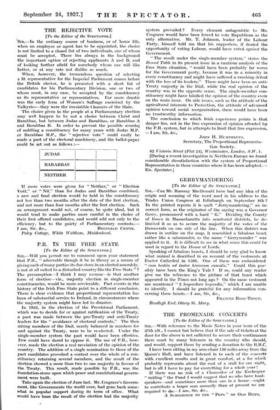P.R. IN THE FREE STATE
[To the Editor of the SPECTATOR.] Sut,—Will you permit me to comment upon your statement that P.R., " admirable though it be in theory as .a means of giving each of many parties its due share in an elected assembly, is not at all suited to a disturbed countrylike the Free State " ? The presumption—I think I may assume—is that another form of election—viz., majority election in single-member constituencies, would be more serviceable. Past events in the history of the Irish Free State point to a different conclusion. There is clear evidence that proportional representation has been of substantial service to Ireland, in circumstances where the majority system might have led to disaster.
In 1922, in the election of the Provisional Parliament, which was to decide for or against ratification of the Treaty, a pact was made between the pro-Treaty and anti-Treaty leaders for the " avoidance of electoral contests." The then sitting members of the Dail, nearly balanced in numbers for and against the Treaty, were to be re-elected. Under the single-member system the pact would have been effective. Few could have dared to oppose it. The use of P.R., how- ever, made the election a real revelation of the opinion of the country. The addition of a single nomination to those of the pact candidates provoked a contest over the whole of a con- stituency returning several members, and the result of the election showed a more than two to one majority in favour of the Treaty. This result, made possible by P.R., was the foundation-stone upon which peace and constitutional govern- ment were built.
Take again the election of June last. Mr. Cosgrave's Govern- ment, like Governments the world over, had gone back some- what in popular support during its term of office. What would have been the result of the election had the majority
system prevailed ? Every element antagonistic to Mr. Cosgrave would have been forced to vote Republican as the only alternative. Mr. T. Johnson, leader of the Labour Party, himself told me that his supporters, if denied the opportunity of voting Labour, would have voted against the Government.
" The result under the single-member system," states the Round Table in its present issue in a cautious analysis of the Free State situation, " would have been probably far worse for the Government party, because it was in a minority in every constituency and might have Suffered a crushing defeat with the loss of its leaders." There might have been an anti- Treaty majority in the Dail, while the real opinion of the country was in the opposite sense. The single-member con- stituency might have falsified the opinion of the country even on the main issue. On side issues, such as the attitude of the agricultural interests to Protection, the attitude of advanced opinion toward social reorganization, there would have been no trustworthy information.
The conclusion to which Irish experience points is that danger lies, not in the free expression of opinion afforded by the P.R. system, but in attempts to limit that free expression. —I am, Sir, &c.,
JOAN H. HUMPHREYS,
Secretary, The Proportional Representa- tion Society.
82 Victoria Street (Flat 24), Westminster, London, S.W. I.
[During a recent investigation in Noithern Europe we found considerable dissatisfaction with the system of Proportional Representation in those countries where it has been adopted.— ED. Spectator.]










































 Previous page
Previous page